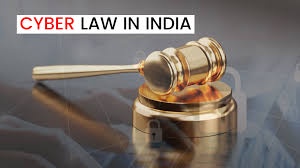In today's digital age, the internet has become an integral part of our daily lives, revolutionizing the way we communicate, work, shop, and access information. However, along with its many benefits, the digital world also brings forth numerous challenges, including cybercrimes and legal issues. To address these challenges, countries around the world, including India, have enacted cyber laws to regulate and govern online activities. In this comprehensive guide, we will delve into the realm of cyber laws in India, exploring their purpose, key provisions, enforcement mechanisms, and the role of legal professionals in this domain.
Evolution of Cyber Laws in India
Cyber laws in India have evolved significantly over the years to keep pace with technological advancements and the growing complexities of cybercrimes. The Information Technology Act, 2000 (IT Act) serves as the primary legislation governing cyber activities in the country. Enacted on October 17, 2000, the IT Act aimed to provide legal recognition to electronic transactions, facilitate e-governance, and address cybercrimes and data protection.
Key Provisions of the Information Technology Act, 2000
-
Legal Recognition of Electronic Records: The IT Act grants legal recognition to electronic records and digital signatures, making them equivalent to their paper-based counterparts in legal proceedings.
-
Cybercrimes and Offenses: The Act identifies various cybercrimes such as hacking, identity theft, phishing, cyberstalking, and dissemination of obscene material online. It prescribes penalties and punishments for these offenses, including imprisonment and fines.
-
Data Protection and Privacy: The IT Act contains provisions related to data protection and privacy, including the obligation of entities handling sensitive personal data to maintain confidentiality and security measures.
-
Intermediary Liability: The Act outlines the liability of intermediaries such as internet service providers (ISPs) and social media platforms for the content posted or transmitted through their platforms. It provides a safe harbor provision for intermediaries if they comply with certain due diligence requirements.
Amendments and Updates to the IT Act
Since its enactment, the IT Act has undergone several amendments and updates to address emerging cyber threats and align with international best practices. Some notable amendments include:
-
Amendment in 2008: The IT Act was amended to introduce provisions related to cyber terrorism, increase penalties for cyber offenses, and enhance the powers of law enforcement agencies to investigate cybercrimes.
-
Amendment in 2013: The IT Act was further amended in 2013 to strengthen provisions related to data protection, electronic signatures, and cybercrimes. The introduction of Section 66A, which dealt with offensive online content, was a significant aspect of this amendment. However, this section was later struck down by the Supreme Court of India in 2015 due to concerns regarding freedom of speech and expression.
Enforcement Mechanisms and Agencies
Enforcing cyber laws and combating cybercrimes require a coordinated effort involving various government agencies and law enforcement bodies. Some of the key agencies involved in the enforcement of cyber laws in India include:
-
Cyber Crime Investigation Cells: Many states have established dedicated cyber crime investigation cells to handle cybercrime complaints, conduct investigations, and prosecute offenders.
-
National Cyber Crime Reporting Portal (Cyber Crime Prevention Against Women & Children): The Ministry of Home Affairs operates this portal to facilitate the reporting of cybercrimes, particularly those targeting women and children.
-
Cyber Appellate Tribunal (CAT): The CAT is an appellate body established under the IT Act to hear appeals against orders issued by the Controller of Certifying Authorities and adjudicate on cyber law matters.
-
Indian Computer Emergency Response Team (CERT-In): CERT-In is the national nodal agency for cybersecurity incidents, response, and coordination. It plays a crucial role in enhancing cybersecurity resilience and addressing cyber threats at the national level.
Role of Legal Professionals in Cyber Law
Legal professionals specializing in cyber law play a vital role in ensuring compliance with cyber laws, protecting individuals and organizations from cyber threats, and advocating for their rights in cyber-related legal matters. Their responsibilities may include:
-
Advising on Compliance: Cyber law experts advise businesses and individuals on compliance with cyber laws, data protection regulations, and best practices for cybersecurity.
-
Cybercrime Investigation and Litigation: They assist in cybercrime investigations, gather evidence, and represent clients in legal proceedings related to cyber offenses.
-
Contract Drafting and Review: Cyber law attorneys draft and review contracts related to electronic transactions, data protection, software licenses, and cybersecurity agreements to ensure legal compliance and mitigate risks.
-
Data Privacy and Protection: Legal professionals in this field advise on data privacy policies, data breach incidents, and represent clients in cases involving unauthorized access to sensitive information.
Recent Developments and Future Trends
In recent years, India has witnessed significant developments in the field of cyber laws, including initiatives to strengthen cybersecurity infrastructure, enhance data protection frameworks, and promote digital innovation. Some notable trends and developments include:
-
Data Protection Legislation: The Personal Data Protection Bill, 2019, aims to regulate the processing of personal data and establish a data protection authority to oversee compliance with data protection principles.
-
Cybersecurity Awareness Programs: Government agencies, industry associations, and cybersecurity experts are conducting awareness programs and training sessions to educate individuals and businesses about cyber threats and preventive measures.
-
Emergence of Cyber Insurance: With the increasing risks of cyberattacks and data breaches, the demand for cyber insurance policies to mitigate financial losses and liabilities has grown significantly.
-
International Cooperation: India is actively engaged in international cooperation efforts to combat cybercrimes, enhance information sharing, and promote cybersecurity best practices at the global level.
Conclusion
Cyber laws in India play a crucial role in safeguarding digital transactions, protecting individual rights, and combating cybercrimes. As technology continues to advance, the legal landscape in cyberspace will evolve, requiring continuous updates, awareness, and collaboration among stakeholders. Legal professionals specializing in cyber law will continue to play a pivotal role in navigating the complexities of the digital world and ensuring a secure and resilient cyber ecosystem for all stakeholders.


No comments yet